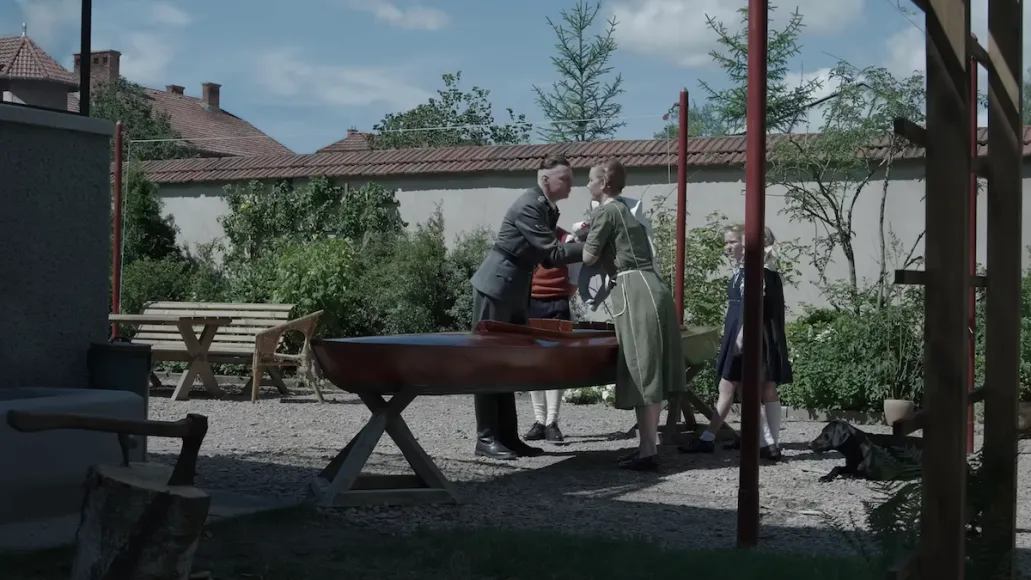
The concept of evil triumphing within society not because of some over-the-top conquest, but because of everyday people becoming numb to the slow march of what they know to be wrong is an oft explored concept within the annals of fiction. “Good men doing nothing” is almost cliche at this point, a platitude meant to try to implore people to be their best in the face of social pressure to do otherwise. But what does this concept of people being lulled to sleep as evil is done around them truly look like?
The Zone of Interest is a fictional account of the commandant of the Auschwitz concentration camp, Rudolf Höss (Christian Friedel), and his wife Hedwig (Sandra Hüller) and their construction of a dream homestead built adjacent to the infamous camp.
Simplicity and plainness are often seen as negatives in regard to a film’s description, but given what director Jonathan Glazer is trying to communicate to its audience, The Zone of Interest’s mundane depiction of the Höss family’s daily life is what provides the film with its soul-crushing power. From its prolonged opening scene where the audience is shown a pristine, emerald green garden and idyllic house with a stark dividing line represented by a giant monochrome wall just hiding the tops of prison camps in the background as Hedwig Höss casually carries on conversation, the true scope of the banality of evil is laid bare by having the horrors of Auschwitz always lingering in the background, contrasted with the ho-hum attitudes and actions of the Nazis who live in its shadow. The hints of what is occurring adjacent to the Höss household is subtly referenced and hinted throughout less through direct dialogue within the script, but through the audience’s sensory experience both visually and sonically. While the occupants of the Höss household are eating dinner or preparing for bed, you may hear faint cries and screams in the far background of Auschwitz occupants and the brutality visited upon them; the raised tones, again in the far auditory background, of Nazi concentration camp guards yelling at prisoners while the Höss family lives out their lives; and of course, the ever present image of the camp itself just over the wall of the Höss well-maintained home.
The unspoken presence of evil that is made plain to the viewer yet all but ignored by most of the Höss household’s occupants somehow makes the brutality and cruelty of World War II’s atrocities that much more visceral and impactful. What Schindler’s List did for etching into history the naked viciousness of the Nazi’s crimes against humanity, The Zone of Interest does in emphasizing through routine what turning a blind eye to evil out in the open really looks like in practice. The Höss family’s Jewish servants often slip out under the cover of night to leave out food and other items for the prisoners hidden in various spots on the grounds, a dangerous mission beautifully shot by Glazer and director of photography Lukasz Zal in black and white infrared vision, but little in the way of resistance rises from the Germans who visit or occupy the Höss household. Hedwig’s mother visits her daughter’s family for a spell, but soon leaves after being unable to ignore the presence of Auschwitz in the backdrop and observing the fires from the oven at night from her guest bedroom. Still, her disapproval of what is happening is left unsaid directly to the Höss and only evident by the fact that she leaves suddenly and without warning. The inaction from those in a position to intervene, coupled with the relaxed acceptance of those who gleefully participate create an all-encompassing view of the depths to which permissiveness and passivity can drag down our humanity.
The Zone of Interest takes the monotonous and turns it captivating by using said mundanity to emphasize real life historical horrors. Director Jonathan Glazer’s usage of atmosphere to turn the idea of how the Holocaust occurred on its head succeeds in not just recontextualizing what happened during World War II, but in raising questions that can be applied to our world regarding what we observe take place in the present and how we use our own voices today.
Image: A24


I am sorry to say, but I wonder if the Israelis living near the border of Gaza imagine what is going on on the other side. Perhaps they’ve all been relocated for the duration of the conflict. I am not equating them with their former Nazi persecutors, only to note the human capacity to ignore and justify the suffering others.